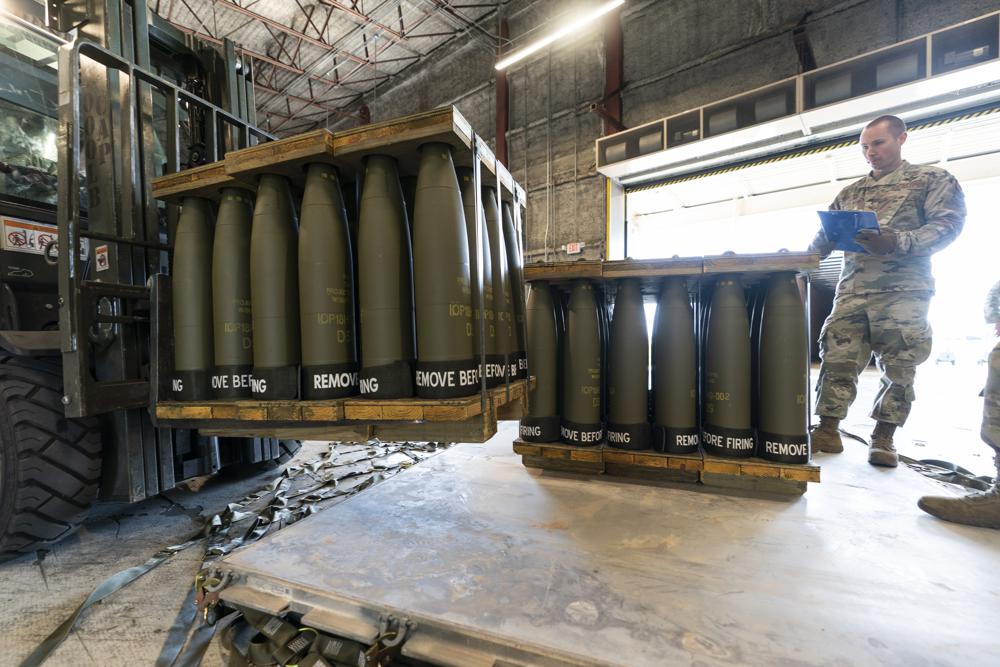The Biden administration said Monday it was shipping its biggest yet direct delivery of weapons to Ukraine as that country prepares for a potentially decisive counteroffensive in the south against Russia, sending $1 billion in rockets, ammunition and other material to Ukraine from Defense Department stockpiles.
The new U.S. arms shipment would further strengthen Ukraine as it mounts the counteroffensive, which analysts say for the first time could allow Kyiv to shape the course of the rest of the war, now at the half-year mark.
Kyiv aims to push Russian troops back out of Kherson and other southern territory near the Dnipro River. Russia in recent days was moving troops and equipment in the direction of the southern port cities to stave off the Ukrainian counteroffensive.
“At every stage of this conflict, we have been focused on getting the Ukrainians what they need, depending on the evolving conditions on the battlefield,” Colin Kahl, undersecretary of defense for policy, said Monday in announcing the new weapons shipment.
The new U.S. aid includes additional rockets for the High Mobility Artillery Rocket Systems, or HIMARS, as well as thousands of artillery rounds, mortar systems, Javelins and other ammunition and equipment. Military commanders and other U.S. officials say the HIMARS and artillery systems have been crucial in Ukraine’s fight to block Russia from taking more ground.
While the U.S. has already provided 16 HIMARS to Ukraine, Kahl said the new package does not include additional ones.
“These are not systems that we assess you need in the hundreds to have the type of effects” needed, Kahl said. “These are precision-guided systems for very particular types of targets and the Ukrainians are using them as such.”
He declined to say how many of the precision-guided missile systems for the HIMARS were included in Monday’s announcement, but said the U.S. has provided “multiple hundreds” of them in recent weeks.
The latest announcement brings the total U.S. security assistance committed to Ukraine by the Biden administration to more than $9 billion.
In his nightly video address, Ukrainian President Volodymyr Zelenskyy thanked the United States for the package, and said “100% of it we will use to protect freedom, our common freedom.”
Until now, the largest single security assistance package announcement was for $1 billion on June 15. But that aid included $350 million in presidential drawdown authority, and another $650 million under the Ukraine Security Assistance Initiative, which provides funding for training, equipment and other security needs that can be bought from other countries or companies.
Monday’s package allows the U.S. to deliver weapons systems and other equipment more quickly since it takes them off the Defense Department shelves.
In addition to the rockets for the HIMARS, it includes 75,000 rounds of 155mm artillery, 20 mortar systems and 20,000 rounds for them, 1,000 shoulder-mounted Javelin rockets, and other arms, explosives and medical equipment.
For the last four months of the war, Russia has concentrated on capturing the Donbas region of eastern Ukraine, where pro-Moscow separatists have controlled some territory as self-proclaimed republics for eight years. Russian forces have made gradual headway in the region while launching missile and rocket attacks to curtail the movements of Ukrainian fighters elsewhere.
Kahl estimated that Russian forces have sustained up to 80,000 deaths and injuries in the fighting, though he did not break down the figure with an estimate of forces killed.
He said the Russian troops have managed to gain “incremental” ground in eastern Ukraine, although not in recent weeks. “But that has come at extraordinary cost to the Russian military because of how well the Ukrainian military has performed and all the assistance that the Ukrainian military has gotten. And I think now, conditions in the east have essentially stabilized and the focus is really shifting to the south.”
The new funding is being paid for through $40 billion in economic and security aid for Ukraine approved by Congress in May.
This is the 18th time the Pentagon has provided equipment from Defense Department stocks to Ukraine since August 2021.
The U.S. and allies still are evaluating whether to supply aircraft to Ukraine, Kahl said. It’s “not inconceivable that western aircraft down the road could be part of the mix,” he said.
Zelenskyy early in the war made near-daily appeals for warplanes, calling them essential to protecting Ukraine’s skies. The U.S. and some other NATO countries feared that could draw them into more direct involvement with Ukraine’s war against Russia, and have not provided Western aircraft.
Separately Monday, the Treasury Department said it was sending $3 billion more in direct economic assistance to Ukraine. That’s part of a previously approved $7.5 billion in economic assistance, with $1.5 billion yet to be disbursed.

